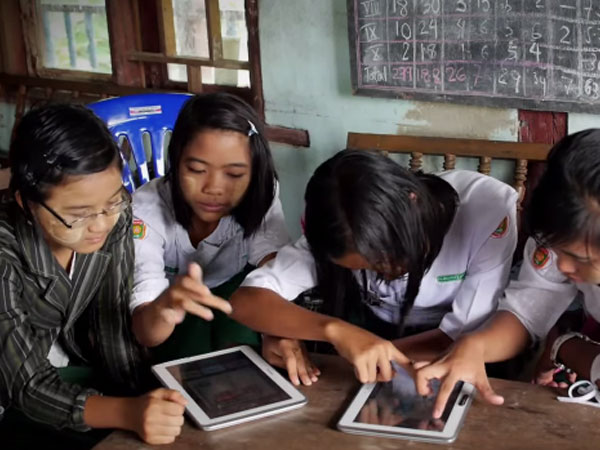 Glamour is the unlikely jumping-off point for a fascinating insight into how tablets and e-books are transforming education in one of Asia’s poorest countries – Myanmar. Connect to Learn Myanmar, a public-private partnership supported by Ericsson as well as other NGOs and corporates like Qualcomm and Intel, is part of the Connect to Learn initiative, under the headline: “Educate a Girl. Change the World.” According to Ericsson’s post on the project, “the Connect to Learn project in Myanmar will benefit 21,000 students, both male and female, in three regions in the country by 2017. With 155 teachers already trained in ICT skills, including how to use laptops and other connected devices, the students are already benefiting from having ICT integrated into their day-to-day learning.”
Glamour is the unlikely jumping-off point for a fascinating insight into how tablets and e-books are transforming education in one of Asia’s poorest countries – Myanmar. Connect to Learn Myanmar, a public-private partnership supported by Ericsson as well as other NGOs and corporates like Qualcomm and Intel, is part of the Connect to Learn initiative, under the headline: “Educate a Girl. Change the World.” According to Ericsson’s post on the project, “the Connect to Learn project in Myanmar will benefit 21,000 students, both male and female, in three regions in the country by 2017. With 155 teachers already trained in ICT skills, including how to use laptops and other connected devices, the students are already benefiting from having ICT integrated into their day-to-day learning.”
As described in the Glamour article, tablets are now fully integrated into teaching at the participating schools in Myanmar, with pupils not only following e-textbooks, but also learning English pronunciation online through their tablets. “With the right ecosystem of visionary school leadership, ICT hardware, connectivity, digital learning content and trained teachers, ICTs can open up a world of knowledge and opportunity for cross-cultural learning,” states Connect to Learn.
“Our Connect to Learn Myanmar students will now be at par with their peers in more developed countries when it comes to having access to a connected device. It’s remarkable given that access to mobile connectivity was very limited in Myanmar just four years ago,” Ericcson states. “The students we’ve interacted with in some of the schools this January took to the devices easily and were happily browsing for content minutes after the tablets were handed to them. It wasn’t hard to tell that they were enjoying their internet experience.” Qualcomm, meanwhile, “through its Qualcomm® Wireless Reach™ initiative, also provides funding and the program utilizes mobile devices enabled by Qualcomm® Snapdragon™ processors.”
You can’t help but feel that many Western schools could benefit from such an attitude to e-learning. In any case, it looks like a great effort to close the digital divide, and a vindication of the place of tablets in education.

































